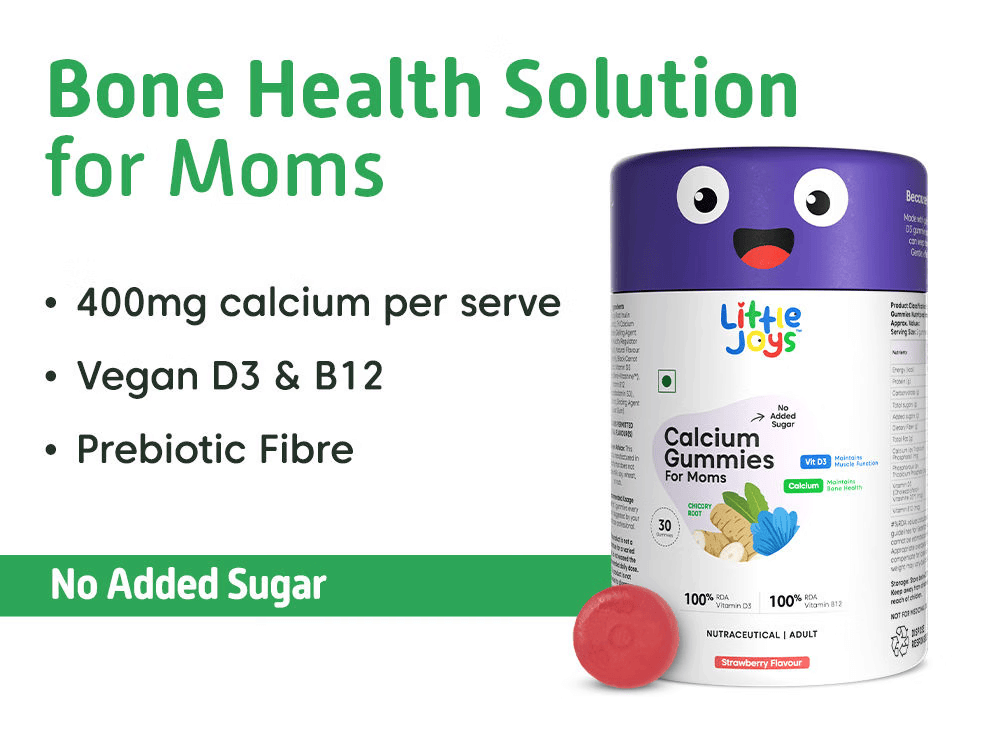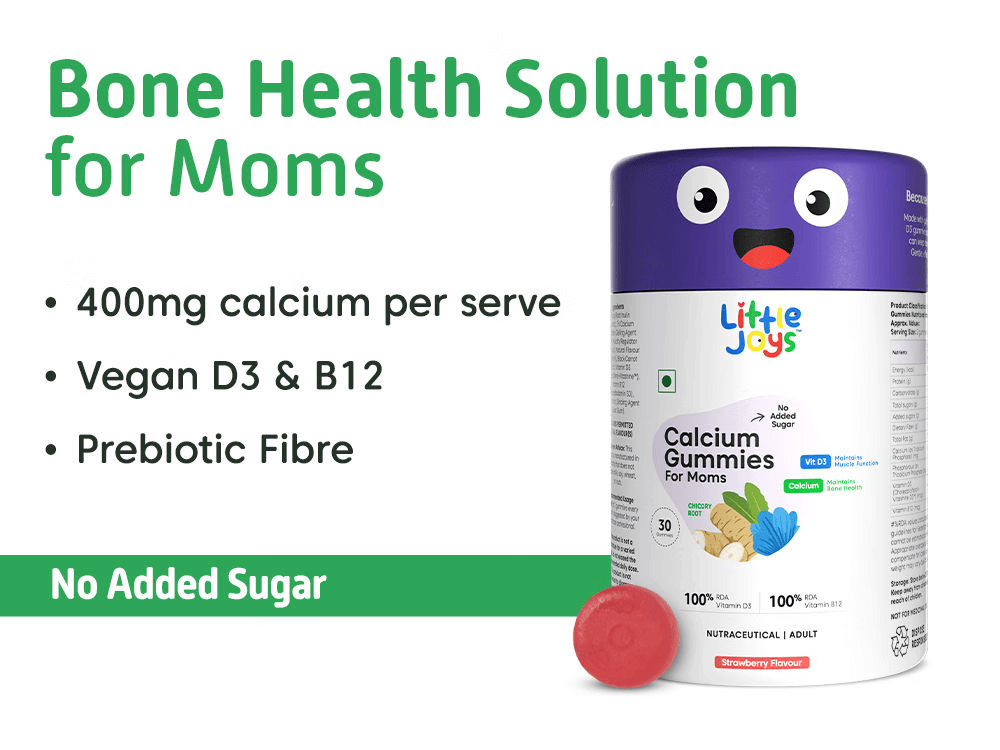Moms Calcium Supplements: Are You Really Absorbing Your Calcium?
Not all calcium supplements are the same. This guide explains how calcium carbonate, calcium citrate, and gummies differ in absorption, digestibility, and ease of use. Find out which form is gentle on the stomach, supports bone health, and is easy to include in your daily routine.

You may be dutifully taking calcium pills or tablets, but studies show only a fraction of that calcium actually makes it into your bloodstream. In fact, research finds the supplement absorption rate is low – only about 25–36% of a calcium dose is absorbed. For example, NIH reports the body absorbs about 36% of a 300 mg dose but only 28% of a 1000 mg dose. In practical terms, roughly 70% or more of a large calcium pill can pass through unused. These absorption bottlenecks mean that despite swallowing chalky tablets, many Indian moms still run at a net calcium deficit. A Lancet nutrition study confirmed that nearly 70% of people worldwide (especially young women in South Asia) don’t consume enough calcium. No wonder up to 70% of Indian women report fatigue and muscle pain from hidden calcium deficiency. The real question is not “Am I taking calcium?” but “How much of that calcium is your body actually using?”
The Calcium Absorption Problem: Why 70% Can Be Wasted
Simply swallowing a calcium tablet isn’t enough – your body can only absorb so much at once. In fact, calcium absorption follows an inverse pattern: the more you take in one sitting, the less percentage your gut picks up. Studies show that split doses (≤500 mg each) are absorbed best. Once absorption pathways saturate, only 5–10% of any extra calcium is absorbed. This means a 1000 mg pill might only yield ~300–400 mg into your system. Even calcium from food struggles: supplements often register only 25–35% absorption under lab conditions (versus ~29% from dairy). By contrast, dietary sources like milk can reach similar or slightly higher uptake. In short, if a supplement is large or taken on an empty stomach, most of it gets flushed away.
Beyond dose size, other factors limit uptake. Many busy moms are vitamin D–deficient (common in India), and without enough D3 your intestines can’t absorb calcium effectively. Low stomach acid (common with age or antacids) also impairs calcium carbonate absorption. The result: even if you “stick to the regimen,” roughly 70% of your calcium pill may never enter your bones. Understanding this absorption problem is the first step to fixing it.
Calcium Carbonate vs Calcium Citrate vs Gummies: Digestibility Breakdown
Not all calcium pills are created equal. The two common forms in supplements are calcium carbonate and calcium citrate – and they behave quite differently in your body. Calcium carbonate contains about 40% elemental calcium by weight, but it requires plenty of stomach acid to dissolve. It’s best taken with meals; otherwise much of it won’t break down. Many women find carbonate gives mild constipation or bloating. In fact, studies note that carbonate is the form most likely to cause GI upset. By contrast, calcium citrate (only ~21% elemental calcium) is more easily absorbed, even on an empty stomach or if your acid is low. Citrate’s gentler profile makes it ideal for moms with sensitive tummies or those on antacids. (The tradeoff: you might need to swallow more citrate tablets to reach the same dose.)
What about chewable or gummy forms? Unlike dense tablets, gummies dissolve quickly in the mouth and stomach. Many nutritionists find that chewable calcium can lead to faster uptake of nutrients. One analysis of supplement formats notes that gummies and chewables often have higher compliance and can even “help with absorption” because they break down fast. While a hard pressed tablet can sit in your gut, these gummy vitamins start working right away. Moreover, gummies allow smaller doses distributed throughout the day (avoiding the one-big-dose pitfall). In practical terms, the best calcium form is one that your body can actually take in easily – for most women that means calcium citrate or other soluble forms, ideally in a chewable gummy format.
The Cofactor Advantage: Vitamin D3, B12 & Prebiotics
Calcium doesn’t work in isolation; it needs the right partners. Vitamin D3 is the cofactor that turns on calcium absorption. Without enough D3, the intestines only absorb a tiny fraction of dietary calcium. In fact, experts note that if you don’t have adequate vitamin D from sun or diet, “you can’t absorb calcium properly”. That’s why the best calcium supplements include D3. Many Indian moms are D3 deficient, so a chew with vegan vitamin D3 ensures the calcium actually makes it into bones (rather than just passing through).
Next, vitamin B12 – another common deficiency in vegetarian women – indirectly supports bone and muscle health by preventing fatigue. B12 deficiency can sap energy levels; it often causes fatigue and weakness as an early symptom. Including B12 with calcium (as Our Little Joys does) helps ensure your cells have the energy to remodel bone and muscle.
Finally, the often-overlooked gut factor: prebiotic fiber. Ingredients like chicory root fiber (inulin) act as food for beneficial gut bacteria. Research shows that prebiotic fibers can actually boost calcium absorption and bone density. In other words, a healthy gut microbiome helps pull more calcium out of each dose. This is why some modern supplements now add prebiotics: they turn your digestive tract into a calcium-concentrating environment. In sum, look for a formula that pairs calcium with D3, B12, and gentle prebiotic fiber – these cofactors multiply your calcium uptake.
Why Chalky Tablets Often Fail Moms
Let’s be honest: traditional calcium tablets can be hard to swallow and easy to skip. They’re often giant and chalky, which makes mothers groan at the sight of a big, white pill. Not only is swallowing one tough, but those additives and binders can irritate your gut. About a third of people on calcium carbonate report gas, bloating or constipation. For moms juggling work, kids, and chores, remembering to schedule multiple big pills with meals is just too much. Many tablets also require timing away from iron or antiacids, complicating already-busy routines.
- Poor compliance: A pill that tastes bad or feels unpleasant is easy to abandon. Studies show that when supplements taste good, people are far more consistent in taking them. If a mum has to choke down a nasty tablet each day, she will likely do it irregularly or stop altogether.
- Gastrointestinal side effects: Calcium carbonate tablets, in particular, are notorious for causing constipation or upset stomach. This leaves many moms dreading their supplement time. Even calcium citrate can cause some discomfort if the dose is large.
- Dosing issues: Tablets often pack the daily dose into one or two pills. This violates the absorption tip of “500 mg or less at a time”. In fact, Harvard notes that taking a 1000 mg pill can mean only about half of that actually gets used. So many moms end up absorbing far less than they think.
Because of these factors, most moms don’t consistently finish their calcium tablets. No matter how “well-formulated,” a supplement that ends up in a drawer does nothing.
What Makes Calcium Gummies Different
Calcium Gummies Taste Better, Absorb Better: Strawberry-flavored calcium gummies (like Our Little Joys Moms Calcium Gummies) avoid the chalk. They dissolve quickly in saliva and stomach, so your body can start absorbing calcium right away. These gummies replace hard binders with natural ingredients and fiber, making them gentle on the stomach. Nutrition experts note that chewables often have faster dissolution and better palatability, aiding consistent use. In practice, moms report that they actually look forward to a tasty gummy vs. dreading a chalky pill. This leads to higher adherence and real absorption rather than skipped doses.
Complete Formula with Cofactors: Unlike single-nutrient pills, a high-quality calcium gummy can bundle in everything moms need. For example, Our Little Joys Moms Calcium Gummies combine calcium citrate with vegan vitamin D3 (for better uptake), vitamin B12 (for energy and muscle function), and chicory root prebiotic fiber (to nourish gut bacteria). All these ingredients are known to boost calcium use: vitamin D3 is essential for calcium absorption, B12 fights fatigue, and inulin fiber has been proven to increase calcium absorption and bone health. In short, a good gummy is not just “calcium candy” – it’s a thoughtfully designed supplement.
Gentle, Non-Constipating Calcium: Because these gummies use calcium citrate (a gentle form) plus added fiber, they tend to be non-constipating. (Studies confirm carbonate is the culprit in most GI side effects) Many moms find that switching to a citrate-based chew virtually eliminates cramps and bloating. Sweetened with chicory roots and no refined sugar, no chalky taste also means no unpleasant aftertaste or sugar crash – just effective support that doesn’t slow you down.
How to Choose the Right Calcium Supplement: A Checklist for Moms
- Opt for Calcium Citrate or Chelate: Choose a form like calcium citrate or another soluble form that your body absorbs easily. These are less dependent on stomach acid and gentler on digestion.
- Include Vitamin D3: Make sure vitamin D3 is included, since you need D3 for proper absorption. A supplement without D is often ineffective.
- Add Gut-Friendly Fiber: Look for prebiotic fiber (like chicory root inulin) in the formula. This encourages healthy gut bacteria, which in turn helps pull more calcium into your system.
- Smaller, Frequent Doses: Avoid mega-pills. Two smaller doses (≤500 mg each) yield better absorption. If a product allows splitting, that’s a bonus.
- Check for B12: If you’re vegetarian or feel chronically tired, having vitamin B12 in your supplement can support energy levels.
- Taste and Convenience: You’re more likely to take a supplement you enjoy. Chewable gummies that taste good (and have no chalky aftertaste) significantly boost compliance.
- Clean Label: Avoid extras you don’t need. No added sugars, artificial fillers or allergens means the supplement is better tolerated daily.
Choosing a good calcium gummy means looking at the whole picture – not just the calcium content. Think about absorption first. Make sure your supplement is built for moms: it should be easy to take, include the right cofactors, and support gut health.
Whether you call it a “gummy vitamin” or a chewable calcium tablet, the goal is the same: your body needs to absorb the nutrients. When in doubt, a nutritionist-approved product like Our Little Joys Moms Calcium Gummies can check all these boxes: they’re tasty, vegan, and formulated to actually deliver calcium where you need it.

Calcium Gummies for Moms
These Calcium Gummies are made for moms who carry the weight of the home and still keep moving. Reclaim your strength from within.
Here’s what’s inside:
✅ Calcium + Vegan D3 + B12 supports strong bones, steady energy, and daily stamina
✅ Chicory Root Prebiotic helps your body absorb calcium better
✅ No chalky pills, no sugar crash just clean, effective support in a yummy strawberry gummy
✅ Nutritionists-approved formula. Vegan. No added sugar. No junk.
Loved by Moms.
Made to move with your day not slow you down.
Mom’s body has given everything through pregnancy, breastfeeding, and all-day care – now it’s time to give back. Say goodbye to unpleasant tablets and missed doses, and say hello to a chewable calcium solution that works with your body. If you’re looking for a gentle, vegan calcium option made with clean ingredients, Little Joys Calcium Gummies can be one simple way to support your daily calcium intake.
